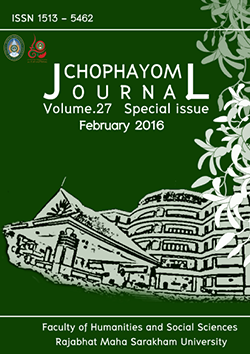Model of Political Participation Development for People in Udorn Thani Province
Abstract
The research aimed to investigate factors affecting political participation development of
people in Udorn Thani province, to design a model of political participation development for
people in Udorn Thani province, and to implement and evaluate the model. The research
methodology was divided into three phases: contextual study, model design, and model
implementation and evaluation. The data was collected by questionnaires from 400 people in
Udorn Thani province. The sample subjects were selected by the proportional stratified random
sampling method. The multiple linear regression analysis was employed for data analysis.
A model of political participation development was designed based on the result of phase 1 and
the model was developed through the workshop, focus group and brain storming methods of
30 participants. The model was implemented to 320 people of the experimental group in Darn
village, Chiangwang Sub-district, Pen District, Udorn Thani province. MANOVA (Repeated
Measures) was used for hypotheses testing at the .05 level of the statistical significance.
The findings showed that the factors significantly affected the political participation of people in
Udorn Thani province at the .05 level. The factors included catching up with political news,
rewards, trust in politicians, political party membership, political campaign, political leaders and
faith in political party. The percentage of the variance of variables was 63% (R = 0.630).
The model of political participation for people in Udorn Thani province consisted of ten major
activities: brain storming, training courses of democratic rights and roles, attitude towards
democracy, catching up political news, Political Parties Act, roles and rights of political parties,
ideology, principles and strategies of political parties for the memberships, political parties
administration, motivation for political participation and study visit to the best practice of
political administration. Lastly, the findings indicated that the sample subjects participated
significantly the political activities after implementing the model more than before implementing
the model at the .05 level.






